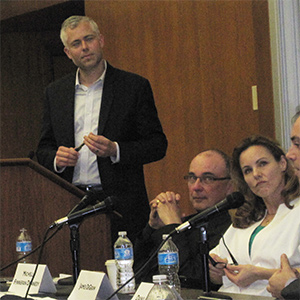
By Andrew Cohen
Before a rapt Berkeley Law audience, four renowned privacy experts tackled hot-button topics at the Riesenfeld Symposium “Who’s Watching? Global Perspectives on Privacy” afternoon panel on February 27. The event was presented by the Berkeley Journal of International Law (BJIL) and moderated by Chris Hoofnagle, director of information privacy programs at the Berkeley Center for Law & Technology.
That night, Jones Day partner Steven Smith ’83 received the Riesenfeld Memorial Award, given annually to a scholar or practitioner who has made outstanding contributions to international law. The award honors the memory of former Berkeley Law professor and international law authority Stefan A. Riesenfeld. A top international arbitration attorney, Smith founded and served as editor-in-chief of International Tax and Business Lawyer, the precursor to BJIL.
The panel—two esteemed academics, a veteran law-firm partner, and a senior technology officer—differed on certain issues. But they clearly agreed that privacy issues will become increasingly prevalent—and paramount.
“Data drives our information economy and it’s not big data, it’s ginormous data,” said Michelle Dennedy, vice president and chief privacy officer of the computer security software company McAfee. She told a packed classroom of Berkeley Law students that “privacy will hit your practice area, no matter what kind of law you go into.”
As a corporate partner in Ropes & Gray’s technology group, panelist James DeGraw leads projects driven by technology, data, or other intellectual property assets. He said he analyzes data protection laws in two ways: “What do they say you can do with the data, and what do they say the government can do?”
Since last summer’s bombshell leaks by Edward Snowden about the reach of intelligence agency surveillance, DeGraw said companies are “thinking more than ever about where and how data is being stored.”
The Snowden impact
Dennedy, who oversees McAfee’s data privacy policies and practices, described the company’s efforts to incorporate privacy protections earlier than ever—in the very design and engineering of its products. She also criticized Snowden for sharing too much information and exposing too many people to undue risk.

Symposium global privacy panel.
But Colin Bennett, a political science professor at the University of Victoria in British Columbia, said Snowden accelerated overdue reforms in privacy legislation. Bennett writes extensively about the increasing levels of surveillance in modern life and attitudes towards this trend.
“For as long as I can remember, lawyers, technology experts, political scientists, and others have heard that what the privacy reform movement needs is a Chernobyl,” he said. “Whatever you think of Snowden, his revelations provided unequivocally the most important development in privacy protection in decades. They exposed practices that have been arrogant and egregious in their reach, and we have Snowden to thank for that.”
Danilo Doneda, a law professor at Fundação Getúlio Vargas in Rio de Janeiro and a member of Brazil’s Ministry of Justice Committee on Electronic Commerce, marveled at his government’s response to the push for greater privacy protections worldwide.
“Brazilians’ reactions were among the strongest in the world, but my country’s focus is more on protection of the state rather than protection of citizens,” he said. According to Doneda, Brazil is shaping privacy legislation based on the European system of data protection laws because its consumer protection statutes, copied from the U.S., “aren’t enough to protect our citizens.”
Canada passed sweeping data protection legislation in the late 1990s, and Bennett noted that its privacy laws are overseen by commissioners with strong educational and enforcement power. “If you have a privacy problem in Canada, you know where to go to,” he said. “But a Canadian organization that outsources data processing is responsible for ensuring that the company abides by Canadian law, and that creates a complicated, messy series of instruments.”
The panelists agreed that as technology advances create an increasingly globalized world, international privacy standards will be essential. “There will be reform,” Hoofnagle said. “The question is just how radical it will be.”